- Home
- »
- Biotechnology
- »
-
Laser Capture Microdissection Market, Industry Report, 2030GVR Report cover
![Laser Capture Microdissection Market Size, Share & Trends Report]()
Laser Capture Microdissection Market Size, Share & Trends Analysis Report, By Type (Instruments, Consumables, Software, Services), By Application (Research & Development), By End-use, By Region, And Segment Forecasts, 2025 - 2030
- Report ID: GVR-4-68040-442-5
- Number of Report Pages: 118
- Format: PDF, Horizon Databook
- Historical Range: 2018 - 2024
- Forecast Period: 2025 - 2030
- Industry: Healthcare
Laser Capture Microdissection Market Trends
The global laser capture microdissection market size was valued at USD 203.1 million in 2024 and is expected to grow at a CAGR of 8.54% from 2025 to 2030. The increasing demand for precision medicine, rising cancer incidences, and increasing adoption of clinical diagnostics are anticipated to impel the market growth. Moreover, the growing number of research institutions and advancements in molecular biology are a few other factors that are driving the market.
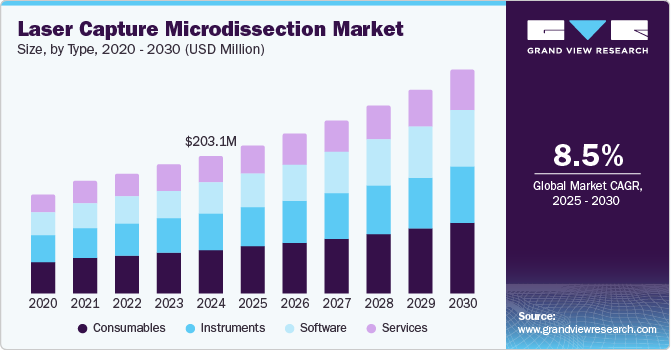
The COVID-19 pandemic has had a significant impact on the laser capture microdissection (LCM) market. The increased focus on understanding and combating the virus has led to a surge in research activities, including studies on virus mechanisms and the development of diagnostic tools, which has driven demand for advanced technologies like LCM. Additionally, the pandemic accelerated the adoption of precision medicine and advanced diagnostics, as researchers and healthcare professionals sought more detailed and accurate analytical tools.
The rising incidence of cancer worldwide has significantly increased the demand for advanced technologies like laser capture microdissection (LCM). Cancer is a highly heterogeneous disease, meaning that tumors can consist of multiple cell types with distinct genetic and molecular profiles. This heterogeneity makes it challenging to understand the disease's progression and to develop effective treatments. LCM provides a powerful solution by enabling researchers to isolate specific cells or microscopic regions from complex, heterogeneous tissue samples. Thus, the growing cancer cases are anticipated to propel the demand for laser capture microdissection market over the forecast period.
However, new and alternative technologies, such as single-cell sequencing and microfluidics, are also gaining traction. These technologies offer different approaches to cell isolation and analysis, sometimes at a lower cost or with less technical complexity, which can compete with LCM and affect its market growth. Furthermore, LCM is primarily used in niche research areas such as molecular biology, oncology, and forensic science. The specificity of these applications limits the broader market appeal of LCM, which impacts overall market revenue.
In addition, high research and development expenditure in life sciences, especially in cancer research, genomics, and personalized medicine, drives the demand for LCM technology. Significant investment in these areas requires precise cellular analysis to understand disease mechanisms, identify genetic mutations, and develop targeted therapies. LCM's ability to provide detailed, high-precision data makes it essential for advanced research, fueling its market growth as R&D spending continues to rise.
Market Concentration & Characteristics
The market growth stage is medium, and the pace is accelerating. The increasing demand for precise cellular analysis in fields like cancer research, genomics, and personalized medicine, combined with rising investments in R&D, is driving this acceleration. As more researchers and clinical labs adopt LCM technology for its accuracy and detailed molecular insights, the market is experiencing faster growth.
In the market, the expansion activities are low to moderate owing to the high costs associated with the technology, including the substantial investment required for equipment and consumables. Additionally, the complexity of the technology necessitates specialized training and expertise, which can limit widespread adoption.
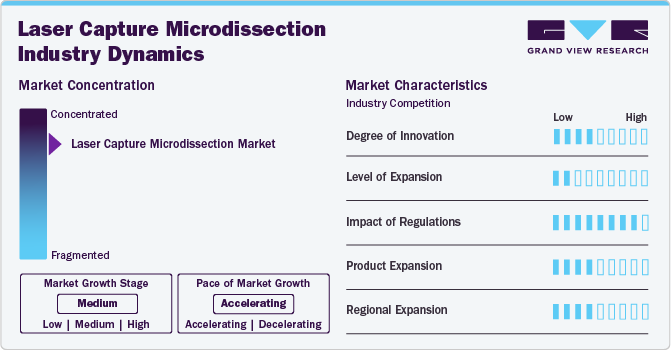
There is a significant impact of regulations on the market due to specific requirements, especially those used in clinical diagnostics, must comply with strict guidelines set by regulatory bodies like the FDA and EMA. These regulations ensure the safety, quality, and effectiveness of the devices, which can boost market trust and adoption.
The market currently exhibits a moderate level of product expansion. While there are ongoing advancements in LCM technologies, such as improved precision and integration with other molecular analysis tools, the pace of introducing new products is steady rather than rapid.
The market currently demonstrates a moderate level of regional expansion. While there is steady growth in key markets such as North America and Europe, expansion into emerging regions like Asia-Pacific, Latin America, and the Middle East is progressing at a moderate pace. This is attributed by increasing investment in biomedical research and rising demand for advanced diagnostic tools in these regions. However, factors such as varying regulatory standards, limited awareness, and differences in healthcare infrastructure slow down more rapid regional market penetration.
Type Insights
The consumables segment accounted for the largest revenue share of 32.66% in 2024. This is attributed to the recurring need for consumables such as caps, slides, reagents, and other materials essential for each LCM procedure. Unlike LCM instruments, which are one-time investments, consumables are required continuously, driving steady and significant revenue generation. The frequent use of these consumables in various research applications, including cancer studies, genomics, and proteomics, further boosts the demand and market share of the segment.
The software segment is projected to witness the fastest CAGR of 10.99% over the forecast period owing to the increasing need for advanced data analysis, image processing, and automation in LCM. Thereby, propelling the demand for LCM software for a more integrated research study with other molecular biology tools, and is anticipated to propel over the forecast period.
End-use Insights
The academic & research institutes segment dominated the market and accounted for the largest revenue share of 46.60% in 2024. This is attributed to the extensive use of LCM technologies in academic and research settings for studying complex biological processes, and disease mechanisms, and developing new treatments. Research institutions invest significantly in LCM to support a wide range of applications, including cancer research, genomics, and proteomics. European research programs, like Horizon 2020, have made developing LCM technologies a top priority to boost biomedical research across Europe.
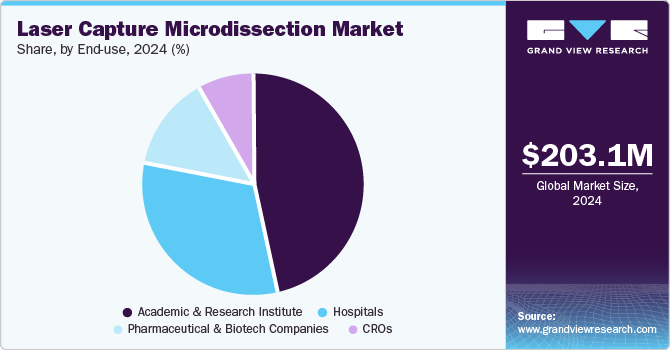
The pharmaceutical & biotech companies segment is expected to witness the fastest growth from 2025 to 2030. This growth is driven by the increasing adoption of laser capture microdissection (LCM) technologies for drug development, biomarker discovery, and precision medicine. Pharmaceutical and biotech firms are leveraging LCM to obtain detailed cellular insights, understand disease mechanisms, and develop targeted therapies more effectively. Thus, anticipated to propel the demand for LCM in pharmaceutical companies and boosting the growth of the segment.
Application Insights
The diagnostics segment accounted for the largest revenue share of 42.77% in 2024. This large share is mainly driven by the increasing application of LCM in clinical diagnostics, where precise cellular analysis is crucial for accurate disease diagnosis and personalized treatment plans. Additionally, advancements in technology and growing awareness of the benefits of LCM in clinical settings are further contributing to the segment’s growth over the forecast period.
The research & development segment is expected to witness fastest growth from 2024 to 2030. This growth is driven by the increasing use of LCM in various research fields, such as cancer research, genomics, proteomics, and personalized medicine. The demand for precise cellular analysis to understand disease mechanisms and develop targeted therapies continues to rise, fueling the adoption of LCM technologies in R&D settings.
According to a research study, published in May 2024, researchers aim to use laser capture microdissection to analyze how T cells interact with lung cancer cells. By isolating these cells from tissue samples, the research seeks to uncover insights that could lead to new treatment approaches or diagnostic tools for lung cancer. In addition, substantial funding and investments in biomedical research further boost the expansion of the R&D segment, making it the fastest-growing application area in the LCM market.
Regional Insights
North America laser capture microdissection market has dominated the global market with a share of 35.97% in 2024. This attributed to advanced healthcare infrastructure, substantial investment in research and development (R&D), and the presence of key market players. Furthermore, the strong focus on cancer research, genomics, and personalized medicine, coupled with the rising prevalence of cancer and other chronic diseases, is further driving the demand for precise cellular analysis tools like LCM. Thereby, propelling the demand for laser capture microdissection market in the region over the forecast period.
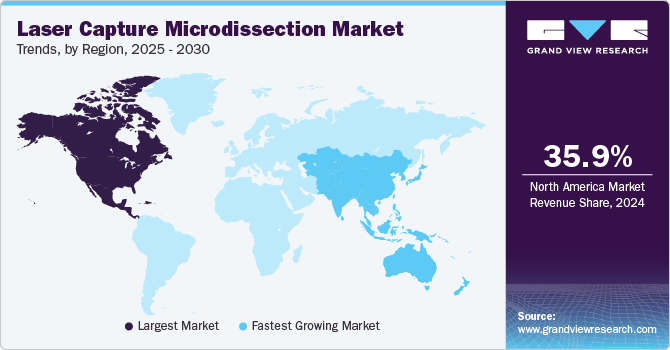
U.S. Laser Capture Microdissection Market Trends
The U.S. laser capture microdissection market in the is expected to grow over the forecast period. This is attributed due to the advanced healthcare infrastructure, robust investment in biomedical research, and increasing adoption of LCM technologies in academic research, clinical diagnostics, and pharmaceutical development.
Europe Laser Capture Microdissection Market Trends
The Europe laser capture microdissection market is experiencing significant growth, driven by increasing investments in cancer research and personalized medicine, coupled with advancements in biotechnology.
The laser capture microdissection market in the UK is expected to grow over the forecast period. In August 2024, twenty-three companies would be receiving a portion of USD 13.30 million (£12 million) from the Innovate UK Cancer Therapeutics program. This program aims to advance new cancer treatments, including immunotherapies and vaccines, and to address gaps in treatments for childhood and young adult cancers.
France laser capture microdissection market is expected to grow over the forecast period due to rising investments in biomedical research and increasing focus on advanced cancer diagnostics and personalized medicine.
The laser capture microdissection market in Germany is expected to grow over the forecast period. Germany's strong focus on advancing cancer research, genomics, and personalized medicine supports the adoption of LCM technologies.
Asia Pacific Laser Capture Microdissection Market Trends
Asia Pacific laser capture microdissection market is anticipated to grow at the fastest rate of 10.78% over the forecast period. This is attributed to increasing investments in healthcare infrastructure, expanding research capabilities, and rising demand for advanced diagnostic technologies. Furthermore, the rise in academic and research institutions across Asia-Pacific further contributes to the region's dynamic growth in the LCM market.
The China laser capture microdissection market is expected to grow over the forecast period driven by increasing investments in healthcare and biomedical research. China's expanding focus on advancing cancer research, genomics, and personalized medicine is fueling the demand for LCM technologies.
Japan laser capture microdissection market is expected to grow over the forecast period. The presence of leading research institutions and biotechnology companies, along with government initiatives to promote scientific innovation, is anticipated to contribute to market growth.
The laser capture microdissection market in India is expected to grow over the forecast period, driven by increasing investments in healthcare and research infrastructure. India's expanding focus on advancing cancer research, genomics, and personalized medicine is spurring demand for LCM technologies.
Middle East & Africa Laser Capture Microdissection Market Trends
The Middle East & Africa laser capture microdissection market is expected to experience substantial growth from 2024 to 2030 due to several key factors. Increasing investments in healthcare infrastructure and research facilities across the region are driving demand for advanced diagnostic technologies.
The laser capture microdissection market in Saudi Arabia is expected to grow over the forecast period. The expansion of academic and research institutions in Saudi Arabia is contributing to the growing adoption of LCM solutions in both research and clinical settings.
Kuwait laser capture microdissection market is expected to grow over the forecast period. The rising emphasis on adopting advanced diagnostic tools and enhancing precision medicine in Kuwait is likely to drive the expansion of the LCM market in the region.
Key Laser Capture Microdissection Company Insights
The market players are adopting product approval to increase the reach of their products in the market and improve the availability of their products in diverse geographical areas, along with expansion as a strategy to enhance production/research activities. In addition, several market players are acquiring smaller players to strengthen their market position. This strategy enables companies to increase their capabilities, expand their product portfolios, and improve their competencies.
Key Laser Capture Microdissection Companies:
The following are the leading companies in the laser capture microdissection market. These companies collectively hold the largest market share and dictate industry trends.
- Carl Zeiss Meditec AG
- Thermo Fisher Scientific
- Danaher Corporation (Leica Microsystems)
- Molecular Machines & Industries GmbH
- Standard BioTools Inc.
- Caresbio Laboratory LLC
- VitroVivo Biotech
- GnomeDX
- Bruker
View a comprehensive list of companies in the Laser Capture Microdissection Market
Recent Developments
-
In December 2023, Danaher Corporation acquired Abcam plc. Abcam will continue to operate as an independent brand within Danaher's Life Sciences division, which also includes laser capture microdissection devices. This acquisition supports Danaher's strategy to use its technology to better understand complex diseases and speed up drug discovery.
-
In November 2023, Laxco announced the launch of Accuva Cellect Laser Capture Microdissection (LCM) system. This system is anticipated to enable accurate isolation along with capturing cells at individual levels, thus providing an unparallel precision for elevating research analysis.
-
In March 2020, Fluidigm Corporation announced the launch of the AccuLift Laser Capture Microdissection System, a new product portfolio designed for translational and clinical pathology research. The AccuLift system is anticipated to enable precise and efficient capture of individual cells or larger tissue regions for DNA, RNA, and protein biomarker analysis.
Laser Capture Microdissection Market Report Scope
Report Attribute
Details
Market size value in 2025
USD 218.47 million
Revenue forecast in 2030
USD 329.0 million
Growth Rate
CAGR of 8.54% from 2025 to 2030
Actual data
2018 - 2024
Forecast period
2025 - 2030
Quantitative units
Revenue in USD million and CAGR from 2025 to 2030
Report coverage
Revenue forecast, company ranking, competitive landscape, growth factors, and trends
Segments covered
Type, application, end-use, region
Regional scope
North America, Europe, Asia Pacific, Latin America, MEA
Country scope
U.S.; Canada; Mexico; Germany; UK; France; Italy; Spain; Denmark; Sweden; Norway; China; Japan; India; South Korea; Australia; Thailand; Brazil; Argentina; South Africa; Saudi Arabia, UAE; Kuwait
Key companies profiled
Carl Zeiss Meditec AG; Thermo Fisher Scientific; Danaher Corporation (Leica Microsystems); Molecular Machines & Industries GmbH; Standard BioTools Inc.; Caresbio Laboratory LLC; VitroVivo Biotech; GnomeDX; Bruker
Customization scope
Free report customization (equivalent up to 8 analysts working days) with purchase. Addition or alteration to country, regional & segment scope.
Pricing and purchase options
Avail customized purchase options to meet your exact research needs. Explore purchase options
Global Laser Capture Microdissection Market Report Segmentation
This report forecasts revenue growth at global, regional, and country levels and provides an analysis of the latest industry trends in each of the sub-segments from 2018 to 2030. For this study, Grand View Research has segmented the global laser capture microdissection market report based on type, application, end-use, and region.
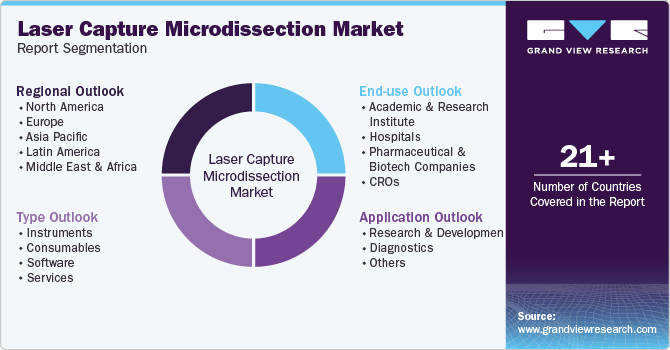
-
Type Outlook (Revenue, USD Million, 2018 - 2030)
-
Instruments
-
Ultraviolet LCM
-
Infrared LCM
-
Ultraviolet & Infrared LCM
-
Immunofluorescence LCM
-
-
Consumables
-
Reagents & Media
-
Assay Kits
-
Others
-
-
Software
-
Services
-
-
Application Outlook (Revenue, USD Million, 2018 - 2030)
-
Research & Development
-
Molecular Biology
-
Cell Biology
-
Forensic Science
-
-
Diagnostics
-
Others
-
-
End-use Outlook (Revenue, USD Million, 2018 - 2030)
-
Academic & Research Institute
-
Hospitals
-
Pharmaceutical & Biotech Companies
-
CROs
-
-
Regional Outlook (Revenue, USD Million, 2018 - 2030)
-
North America
-
U.S.
-
Canada
-
Mexico
-
-
Europe
-
Germany
-
UK
-
France
-
Italy
-
Spain
-
Denmark
-
Sweden
-
Norway
-
-
Asia Pacific
-
China
-
Japan
-
India
-
South Korea
-
Australia
-
Thailand
-
-
Latin America
-
Brazil
-
Argentina
-
-
Middle East & Africa
-
South Africa
-
Saudi Arabia
-
UAE
-
Kuwait
-
-
Frequently Asked Questions About This Report
b. The global laser capture microdissection market size was estimated at USD 203.1 million in 2024 and is expected to reach USD 218.47 million in 2025.
b. The global laser capture microdissection market is expected to grow at a compound annual growth rate of 8.54% from 2025 to 2030 to reach USD 329.0 million by 2030.
b. North America has dominated the market with a share of 35.97% in 2024 for the laser capture microdissection market. The is attributed to advanced healthcare infrastructure, substantial investment in research and development (R&D), and the presence of key market players.
b. Some key players operating in the laser capture microdissection market include Carl Zeiss Meditec AG; Thermo Fisher Scientific; Danaher Corporation (Leica Microsystems); Molecular Machines & Industries GmbH; Standard BioTools Inc.; Caresbio Laboratory LLC; VitroVivo Biotech; GnomeDX; Bruker
b. The high research and development expenditure in life sciences, especially in cancer research, genomics, and personalized medicine, drives the demand for LCM technology.
Share this report with your colleague or friend.
![gvr icn]()
NEED A CUSTOM REPORT?
We can customize every report - free of charge - including purchasing stand-alone sections or country-level reports, as well as offer affordable discounts for start-ups & universities. Contact us now
![Certified Icon]()
We are GDPR and CCPA compliant! Your transaction & personal information is safe and secure. For more details, please read our privacy policy.
We are committed towards customer satisfaction, and quality service.
"The quality of research they have done for us has been excellent."





